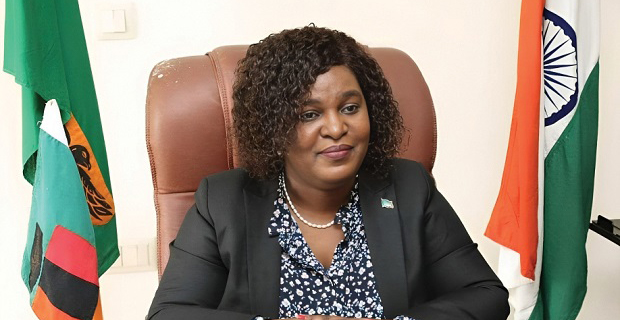“INDIA IS A RELIABLE PARTNER AND FRIEND”
India and Zambia have long-established diplomatic, business and cultural ties. Since India attained independence from Britain, Zambia turned to us for both political and economic support during its own struggle for independence from the empire. Today bilateral ties are flourishing. Acting High Commissioner Mrs Deliwe N Mumbi responded to questions from Diplomatic and Business Editor Yogesh Sood.
What is your message to the people of India who want to travel to your country?
Over the last decade, Zambia has successfully turned the corner. Most evident is a commendable display of economic growth, improved prosperity and easier market access for local and foreign investments in the past decade. During this time Zambia attained economic growth above 5 percent spurred by the expansion of the country’s mining, construction and service industries.

With good governance and a vigorous pursuit of sound macroeconomic policies, Zambia’s macroeconomic environment is stable and considered to be the most favourable in the region with structural changes relating to investment and trade facilitation. All of which now culminate into the significant reduction in the cost of doing business.
Other key strengths that make Zambia an attractive investment destination include:
- An abundance of natural resources and manpower.
- Political stability since attaining its independence in 1964.
- The abolition of controls on: prices, interest rates, foreign exchange rates and free repatriation of debt repayments.
- 100% repatriation of net profits.
- International standard as well as a well-developed Stock Exchange.
- Double Taxation Agreements with a number of European, North American, African and Asian countries.
- The establishment of Multi Facility Economic Zones (MFEZs).
- The acquisition of land by foreign entities facilitated by the Zambia Development Agency.
Market Access: Zambia is party to several regional and international trade and economic groupings. At the regional level, Zambia belongs to the Common Market for Eastern and Southern Africa (COMESA) and the Southern Africa Development Community (SADC).
This implies that Zambia has access to both the COMESA market, which has a combined population of 492.5 million and a GDP of USD 657.4 billion, and the SADC market, which has a combined population of 293 million consumers and a GDP of US$700 billion.
Further, Zambia is a member of the African Continental Free Trade Area (AfCFTA), a free trade area encompassing most of Africa.
At the international level, Zambia is a beneficiary of preferential trade arrangements under various strategic economic partnerships e.g. with the USA, under the Africa Growth Opportunity Act (AGOA); China, under the Forum for China Africa Cooperation (FOCAC); Japan, under the Tokyo International Conference for Africa’s Development (TICAD); India, under the India-Africa Forum (IAF) and Canada under the Global Market Action Plan (GMAP), among others. Zambia is also party to the Cotonou agreement and has benefited from duty-free, quota-free market access for the European market under the Generalized System of Preference (GSP) and the Everything But Arms (EBA) arrangement.
Investment opportunities
The Zambian Government is committed to diversifying the economy away from the mining sector while increasing the number of Public Private Partnerships (PPPs), improving the country’s infrastructure and public sector delivery. The PPP Act was enforced in August 2009 under which the Government encourages and accepts unsolicited bids from investors in any area of investment in all aspects of the economy.
In addition, the Government seeks strategic partners in various projects in ICT, telecommunications, roads and rail, power generation, tourism, waste management and water supply.











Comments.